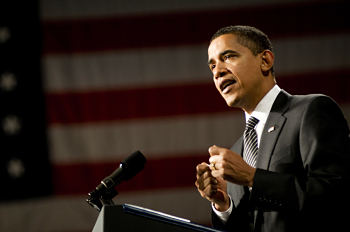Obama Administration Sends Transportation Bill to Congress
The Obama Administration sent a six-year, $478 billion transportation spending bill to Congress last week, asking for a $25 billion per year increase in federal transportation spending beyond the current level of about $50 billion per year.
The biggest increase would come in transit funding, which would realize a 79 percent boost to an average of nearly $74 billion over six years.
The Grow America Act would go a long way toward addressing the nation’s crumbling infrastructure problem, according to U.S. Secretary of Transportation Anthony Foxx.
“All over the country, I hear the same account: the need to repair and expand our surface transportation system has never been greater, and yet federal transportation funding has never been in such short supply,” said Foxx. “Our proposal provides a level of funding and also funding certainty that our partners need and deserve. This is an opportunity to break away from 10 years of flat funding, not to mention these past six years in which Congress has funded transportation by passing 32 short-term measures.”
U.S. DOT says the country faces growing transportation infrastructure needs with 65 percent of America’s roads in need of repair; one out of every four bridges needing to be replaced; and an $86 billion public transit repair backlog.
U.S. DOT says it wants to triple the budget of the National Highway Traffic Safety Administration’s automobile defects office; establish an $18 billion freight program; raise transit investment; speed up project delivery and increase innovative financing methods.
“It is clear to me that transportation is still a bipartisan issue, and I am really encouraged to see members of both parties working to get something done,” Foxx said. “During these next two months, though, all of us who work in Washington need to be relentless in trying to get to ‘yes’ on a bill that is truly transformative and that brings the country together.”
Experts say it is unlikely the White House bill will ever make it to the president’s desk. Congress faces a May 31 deadline to pass a new transportation bill. Given the complexity of approving a long-term bill, the odds are in favor that Congress will pass another short term extension rather than a multi-year bill.
Language in the bill includes provisions:
- Requiring all electronic toll collection for any HOV toll facilities opened on or after October 1, 2016 (Section 1405)
- Awarding grants to states that adopt and implement graduated driver licensing laws that require novice drivers younger than 18 to comply with the 2-stage licensing process before receiving an unrestricted driver’s license (Section 4005)
- Providing a grant program to states that have adopted or are enforcing a law that restricts DUI offenders to only operate vehicles equipped with an ignition interlock device, or mandated participation in a 24-7 sobriety program if a state-certified ignition interlock provider is not available within 100 miles of the individual’s residence (Section 4006)
- Modifying the minimum penalties for repeat DUI offenders to receive for one year, one or more of the following penalties – a suspension of all driving privileges, a restriction to operate only ignition interlock motor vehicles, or participation in a 24-7 sobriety program if an ignition interlock provider is not within 100 miles (Section 4007)
- Establishing a substantial distracted driving grant program, whereby state eligibility is based on state adoption and enforcement of distracted driving laws (Section 4008)
- Restricting the sale, lease, or rental of motor vehicles after receipt of a notification of a defect or noncompliance until the recall is remedied or is set aside due to civil action (Section 4109)
- Requiring dealers to notify the owners of each vehicle it services to provide notification of any defect or noncompliance that has not been remedied (Section 4114)
- Creating a pilot program to evaluate the feasibility and effectiveness of state informing consumers of open motor vehicle recalls at the time of motor vehicle registration. This includes grants to states wishing to propose an approach and participate in the pilot (Section 4115 )
- Requiring states to disqualify a commercial driver and record the violation that caused the disqualification after receiving notice from DOT that an individual has been disqualified for a federal disqualification (Section 5203)
- Stipulating that an individual who receives a verified positive DOT drug test is disqualified from operating a commercial motor vehicle and remains disqualified until the individual completes the substance abuse professional evaluation and treatment and return to duty process (Section 5205)
- Allowing FMCSA to request from a state the driving record of an individual in connection with a safety investigation. This provision adds FMCSA to a privilege that had been previously provided for NTSB and FHWA (Section 5514)






